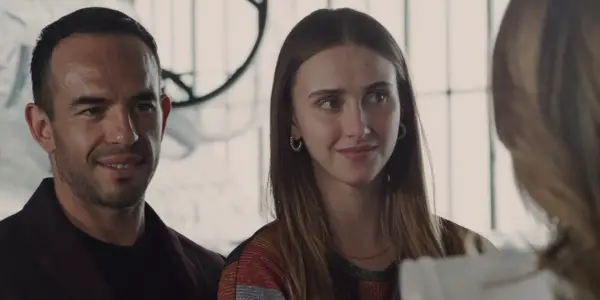THE OTHER SIDE OF THINGS: A Skippable Advertisement

Garrett (They/Them) loves film, theatre, and believes a public library…
The Other Side of Things is a short film about dreams: Patricia, a young, single mother, tries to fulfill her son Andrew’s wishes of being on (and eventually flying) a plane. Although Patricia wants to help Andrew, she is not afforded the opportunity to dream. Instead, Patricia is weighed down by the realities of losing her job, living in her car after being evicted, and worrying about her immigration status. While characters have their own aspirations and personal journeys, The Other Side of Things is ultimately a love letter to the American Dream, for better or for worse.
The American Dream as an ideal has been investigated, interrogated and eviscerated over the years, yet continues to permeate throughout culture. Believing that anyone can rise above their station through hard work and perseverance is alluring, and often easier to swallow than to face the reality of a corrupt system. In reality, the American Dream sustains because it directs us to wish fulfillment fantasy: the dream that fortune and security can be unlocked by being good and “deserving” of the reward.
Horatio Alger and Myth
One tale that helps to perpetuate the mythos of the American Dream are the popular 19th century children’s books by Horatio Alger. In these stories, a down on their luck youth rises to better fortunes through moral behavior, honesty, and good luck. Over time, the “Horatio Alger myth” has morphed into becoming synonymous with self-sufficiency, but the original stories by Alger and the lessons they impart are just as valuable to analyze. In the original meaning, the books of Horatio Alger attempt to uphold the core principles of wish fulfillment by reinforcing that virtuosity and luck are key to rising out of poverty and earning the American Dream.

The Other Side of Things, directed by Guillermo Iván and written by Zair Montes (both pulling double duty as characters Maurizio and Patricia respectively), can be seen as a modern-day version of a Horatio Alger story. Over the course of the film, an innocent young boy named Andrew (Jake Krihkori) raises his family out of poverty, due to the fact that he does a good deed at the right time. By returning the credit card his mom Patricia stole from the client who fired her, Andrew sets in motion a chain of events that ends in the reward of financial stability and security.

The film is over-packed with themes and issues, and never quite makes the landing it hopes for. The characters lack depth, but the film desires to impart that the happy ending is justified because of their inner worthiness. Because Andrew was innocent and made the right decision at the right time, the deus ex machina of Maurizio and the anonymous wealthy benefactors ensure that Patricia does not go to jail and that Andrew can remain among planes. The end result justifies any plot contrivances or twists that need to occur in order to get there.
Jet 1 Cup
But what end does the plot need to arrive to? It’s worth noting how prominently the company Jet 1 Cup features in the film, from their production card at the beginning, down to their logo placement on the company credit card Patricia steals. According to their website, Jet 1 Cup is a “modern aerial combat sport,” and The Other Side of Things is their first venture in conjunction with Golden Ceiba Productions. The end, apparently, is to use a Horatio Alger narrative to disguise a commercial as a prestigious short film.
I am not going to pretend I am too naïve to believe that product placement does not exist, or that companies have never financed art projects to show off the capacity of their tools and wares. The Other Side of Things succeeds as a love letter to the American Dream because it fails to interrogate that love, choosing to prop up an unfair system. However, it does not succeed as a film, because it forgets to be more than just an advertisement. While the technical aspects are serviceable, and the actors do good work, I wish it was not just an ad to sell the world on a new sports league.
What other films uphold or interrogate the American Dream? Let us know your favorites in the comments!
Opportunities to see The Other Side of Things can be found at the Golden Ceiba Production’s Twitter.
Does content like this matter to you?
Become a Member and support film journalism. Unlock access to all of Film Inquiry`s great articles. Join a community of like-minded readers who are passionate about cinema - get access to our private members Network, give back to independent filmmakers, and more.
Garrett (They/Them) loves film, theatre, and believes a public library is the soul of a community. Garrett graduated from Pacific University with a B.A. in Anthropology, with minors in Theatre, and Gender and Sexuality Studies. They perform and create art in Portland, Oregon.













